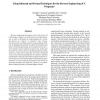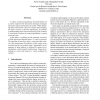151 search results - page 1 / 31 » Using Informal and Formal Techniques for the Reverse Enginee... |
ICSM
1996
IEEE
13 years 9 months ago
1996
IEEE
Reverse engineering of program code is the process of constructing a higher level abstraction of an implementation in order to facilitate the understanding of a system that may be...
WCRE
1999
IEEE
13 years 9 months ago
1999
IEEE
As a program evolves, it becomes increasingly difficult to understand and reason about changes in the source code. Eventually, if enough changes are made, reverse engineering and ...
KBSE
1997
IEEE
13 years 9 months ago
1997
IEEE
Given a program S and a precondition Q, the strongest postcondition, denoted sp(S Q), is defined as the strongest condition that holds after the execution of S, given that S term...
ICSM
2003
IEEE
13 years 10 months ago
2003
IEEE
In object oriented programming, the functionalities of a system result from the interactions (message exchanges) among the objects allocated by the system. While designing object ...
WCRE
2003
IEEE
13 years 10 months ago
2003
IEEE
The inherent differences between C++ and Java programs dictate that the methods used for reverse engineering their compiled executables will be languagespecific. This paper looks ...


